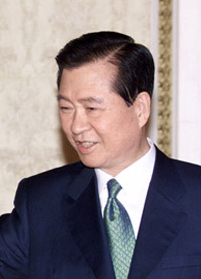Kim Dae-jung
| Kim Dae-jung | |
|---|---|
| 김대중 | |

Kim in 2001
|
|
| 8th President of South Korea | |
|
In office 25 February 1998 – 25 February 2003 |
|
| Prime Minister |
Kim Jong-pil Park Tae-Joon Lee Han-dong Chang Sang Chang Dae-whan Kim Suk-soo |
| Preceded by | Kim Young-sam |
| Succeeded by | Roh Moo-hyun |
| Member of the National Assembly | |
|
In office 30 May 1988 – 19 December 1992 |
|
| Constituency | Proportional Representation |
|
In office 1 July 1971 – 17 October 1972 |
|
| Constituency | Proportional Representation |
|
In office 17 December 1963 – 30 June 1971 |
|
| Constituency | Mokpo (South Jeolla) |
|
In office 14 May 1961 – 16 May 1961 |
|
| Constituency | Inje (Gangwon) |
| Personal details | |
| Born |
6 January 1924 Sābu-do, Sin'an, Zenra-nandō, Japanese Korea (now Hauido, Sinan County, South Jeolla Province, South Korea) |
| Died | 18 August 2009 (aged 85) Seoul, South Korea |
| Cause of death | Multiple organ dysfunction syndrome |
| Resting place | Seoul National Cemetery, Seoul, South Korea |
| Political party |
Democratic Party (1956-61) Democratic Party (1963-65) New Democratic Party (1967-80) Unification Democratic Party (1987) Peace Democratic Party (1987-91) Democratic Party (1991-92) National Congress for New Politics (1995-2000) Democratic Party Independent |
| Spouse(s) |
Cha Yong-ae (m. 1945; d. 1959) Lee Hui-ho (m. 1962–2009) |
| Children | Kim So-hee(daughter,1946-47) Kim Hong-il(son,1948) Kim Hong-up(son,1950) Kim Hong-gul(son,1963) |
| Parents | Kim Woon-sik and Jang Su-geum |
| Education | Mokpo Commercial High School |
| Religion | Roman Catholicism (baptismal name: Thomas) |
| Awards |
Nobel Peace Prize (2000) Philadelphia Liberty Medal (1999) |
| Signature | |
| Military service | |
| Allegiance |
|
| Service/branch |
|
| Rank | Sublieutenant |
| Korean name | |
| Hangul | |
|---|---|
| Hanja | |
| Revised Romanization | Gim Daejung |
| McCune–Reischauer | Kim Taejung |
| Pen name | |
| Hangul | |
| Hanja | |
| Revised Romanization | Hugwang |
| McCune–Reischauer | Hugwang |
Kim Dae-jung (Korean pronunciation: [kimdɛdʑuŋ]; 6 January 1924 – 18 August 2009) was the 8th President of South Korea from 1998 to 2003, and the 2000 Nobel Peace Prize recipient. He was sometimes referred to as the "Nelson Mandela of Asia".
Kim was born on 6 January 1924, but he later registered his birth date to 3 December 1925 to avoid conscription during the time when Korea was under Japanese colonial rule. Kim was the second of seven children to middle-class farmers. Kim was born in Sinan in what was then the Jeolla province; the city is now in Jeollanam-do. Kim's family had moved to the nearby port city of Mokpo so that he could finish high school. Kim graduated from Mokpo Commercial High School in 1943 at the top of the class. After working as a clerk for a Japanese-owned shipping company during the Imperial Japanese occupation of Korea, he became its owner and became very rich. Kim escaped Communist capture during the Korean War.
Kim first entered politics in 1954 during the administration of Korea's first president, Syngman Rhee. Although he was elected as a representative for the National Assembly in 1961, a military coup led by Park Chung-hee, who later assumed dictatorial powers, voided the elections. He was able to win a seat in the House in the subsequent elections in 1963 and 1967 and went on to become an eminent opposition leader. As such, he was the natural opposition candidate for the country's presidential election in 1971. He nearly defeated Park, despite several handicaps on his candidacy which were imposed by the ruling regime.
...
Wikipedia
